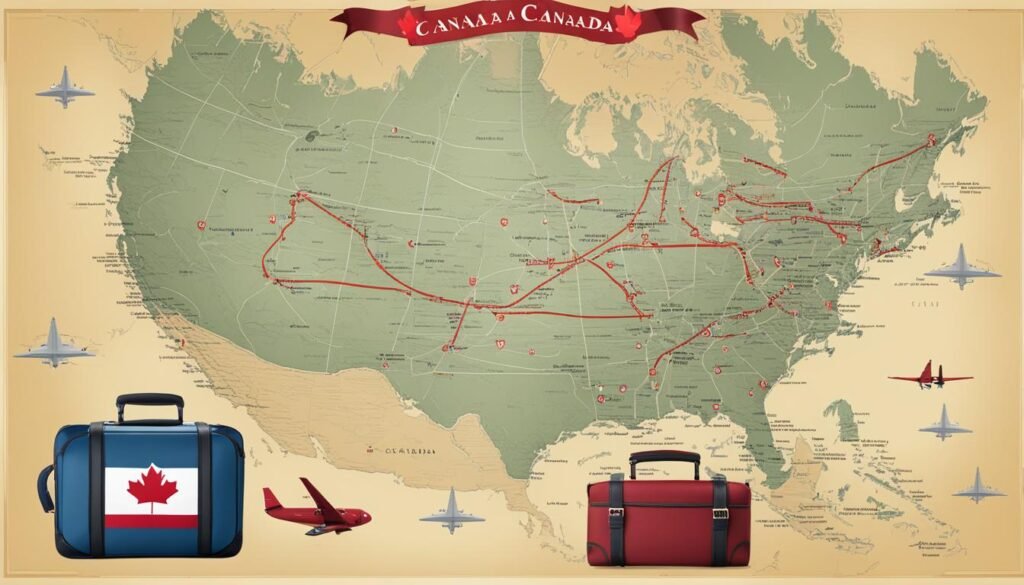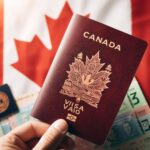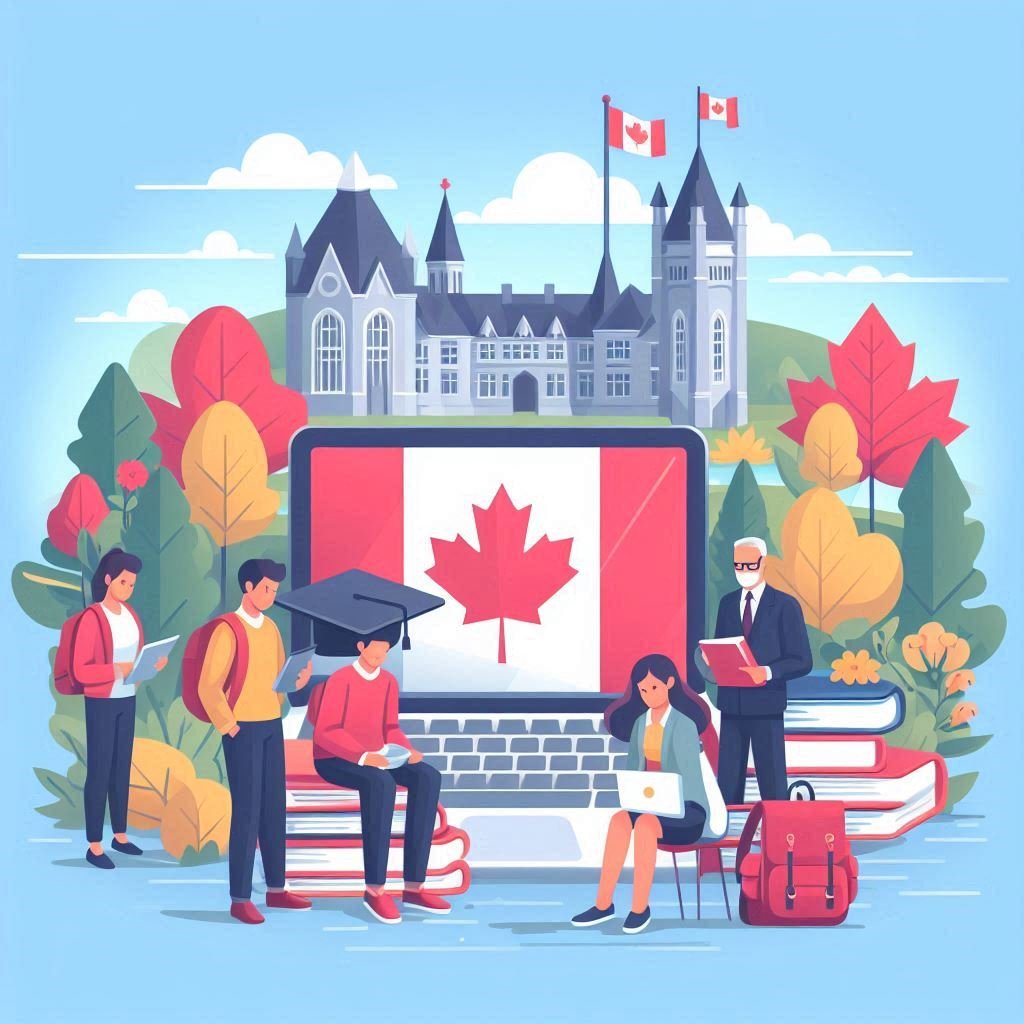Are you considering studying in Canada? If so, you may have questions about the immigration process and what steps are required to obtain a student visa. The good news is that we’re here to help! In this guide, we will walk you through the essential information you need to know to navigate the Canada immigration student visa process successfully. From the application requirements to the travel documents, we’ve got you covered. So, let’s dive in and discover everything you need to study in the land of maple syrup and breathtaking landscapes.
Key Takeaways:
- As of January 22, 2024, students applying for a study permit in Canada must include a provincial attestation letter (PAL) from the province or territory where they plan to study.
- Before applying for a study permit, you must first obtain a letter of acceptance from a Designated Learning Institution (DLI) in Canada.
- There are exemptions to the study permit requirement, such as for family members accompanying foreign representatives or members of the armed forces from designated countries.
- Depending on your country of citizenship, you may need a Temporary Resident Visa (TRV) or an Electronic Travel Authorization (eTA) in addition to your study permit.
- Biometrics, such as fingerprints and a photo, may be required as part of the study permit application process.
Study Permit Application Process
Before embarking on your journey to study in Canada, it is important to understand the study permit application process. Here is a step-by-step guide to help you navigate the requirements and ensure a smooth application:
- Obtain a Letter of Acceptance: Begin by securing a letter of acceptance from a Designated Learning Institution (DLI) in Canada. This letter should outline vital information about your chosen program, including tuition fees, start and end dates, and registration deadlines.
- Check DLI and Quebec Acceptance Certificate (CAQ): Verify if your chosen institution is on the Designated Learning Institution List (DLI) provided by the Canadian government. If you plan to study in Quebec, you may also need to obtain a Quebec Acceptance Certificate (CAQ).
- Meet Immigration Requirements: Familiarize yourself with the requirements outlined in the Immigration and Refugee Protection Act and Regulations. Ensure that you have all the necessary documents and meet the eligibility criteria.
- Prove Financial Support: Provide proof of financial support to demonstrate that you have sufficient funds to cover your tuition fees, living expenses, and other related costs while studying in Canada.
- Submit Application: Complete the Canadian student visa application and gather all the required documents. Make sure to double-check your application for accuracy and submit it within the specified timeline.
Applying for a study permit requires careful attention to detail and adherence to the guidelines set by the Canadian government. By following these steps, you can maximize your chances of a successful application and embark on your educational journey in Canada.
Required Documents for a Canadian Student Visa Application
| Document | Description |
|---|---|
| Letter of Acceptance | A letter from a Designated Learning Institution (DLI) in Canada confirming your acceptance into a program of study. |
| Valid Passport | A passport that is valid for the duration of your planned stay in Canada. |
| Proof of Financial Support | Evidence that you have sufficient funds to cover your tuition fees, living expenses, and other related costs. |
| Study Plan | A detailed outline of your intended course of study, including program details, anticipated start and end dates, and career goals. |
| Language Proficiency Test Results | Official results of an approved language proficiency test demonstrating your proficiency in English or French. |
| Medical Examination Report | A medical examination report conducted by an approved panel physician to ensure your admissibility to Canada. |
| Biometrics | Biometric information, including fingerprints and a photo, must be provided as part of the application process for most applicants. |
Study Permit Exemptions
In general, foreign nationals must obtain a study permit to study in Canada. However, there are some exemptions to this requirement. It is important to understand these exemptions before applying for a study permit.
Families and Private Staff of Foreign Representatives
Family members or private staff accompanying a foreign representative accredited by Global Affairs Canada may be exempted from a study permit. This exemption allows them to study in Canada without the need for a study permit.
Members of the Armed Forces from Designated Countries
Under the Visiting Forces Act, members of the armed forces from designated countries or territories may also be exempt from a study permit. This exemption recognizes the unique status and purpose of these individuals while studying in Canada.
Specific Activities and Programs
There are certain activities and programs that do not require a study permit. These include attending preschool, completing a distance learning program, or taking a non-credit course. While these activities may not require a study permit, it is still important to ensure compliance with other applicable immigration regulations.
Understanding these exemptions is crucial to determining whether you need a study permit for your specific situation. It is recommended to consult the official government sources for the most accurate and up-to-date information regarding study permit exemptions.
Benefits of Study Permit Exemptions
The exemptions mentioned above provide flexibility for certain individuals who wish to study in Canada. By not requiring a study permit, it simplifies the immigration process and allows for a smoother transition into academic life. However, it is important to note that even if you are exempt from a study permit, you may still need other travel documents, such as a visitor visa or an Electronic Travel Authorization (eTA), depending on your country of citizenship.
Temporary Resident Visa (TRV) or Electronic Travel Authorization (eTA)

When planning your journey to Canada as an international student, it is important to be aware of the additional travel documents you may need in addition to your study permit. Depending on your country of citizenship, you may require a Temporary Resident Visa (TRV) or an Electronic Travel Authorization (eTA).
While some countries or territories have agreements in place with Canada that require their citizens to obtain a TRV, others are eligible for an eTA.
A TRV is a paper document that is placed in your passport, granting you permission to enter Canada. On the other hand, an eTA is an electronic document linked to your passport, and it is valid for multiple entries into Canada over a specified period.
To determine if you need a TRV or an eTA, you can consult the official website of Immigration, Refugees and Citizenship Canada (IRCC). There you will find a list of countries and territories along with the corresponding travel document requirements.
It is crucial to research and determine which type of travel document you need based on your country of citizenship. By determining this in advance, you can ensure that you have all the necessary documents before boarding your flight to Canada.
The application process for a TRV or an eTA is straightforward and is included in your study permit application. There is no separate application or fee required for the TRV or eTA. Once your study permit is approved, the TRV or eTA will be issued concurrently.
Temporary Resident Visa (TRV)
A TRV is required for citizens of certain countries or territories to enter Canada. It is typically needed if you are from a country that is not visa-exempt or does not qualify for an eTA, such as India, China, or Brazil.
When applying for a TRV, you will need to provide specific documents and meet certain requirements. These may include a valid passport, proof of financial support, a letter of acceptance from a Canadian educational institution, and other supporting documents specified by IRCC.
It is important to note that the approval of a TRV is subject to the discretion of the visa officer, and you may be required to attend an interview as part of the application process.
Electronic Travel Authorization (eTA)
An eTA is an electronic travel document that is required for citizens of certain countries or territories to enter Canada. It is needed if you are from a country that is visa-exempt, such as the United States, Australia, or the United Kingdom.
Applying for an eTA is a simple and streamlined process that can be done online. You will need to provide personal information, passport details, and answer a few eligibility questions.
Once approved, the eTA will be electronically linked to your passport, eliminating the need for any physical documents or stamps.
Having the necessary travel documents, whether it is a TRV or an eTA, is crucial for entering Canada as an international student. These documents ensure that you meet the requirements and regulations set by the Canadian government for immigration and entry into the country.
Biometrics and Application Processing

As part of the Canadian student visa application process, biometrics play an important role. Biometrics refer to the collection of fingerprints and a photograph from individuals applying for a study permit. These biometric identifiers help verify your identity and support the application process.
If you fall within the age bracket of 14 to 79 years, you will be required to give your biometrics. This process is straightforward and should be completed promptly upon receiving the notification letter.
After submitting your study permit application along with your biometrics, the processing phase begins. The Canadian authorities will carefully review your documents and information to ensure that you meet all the necessary criteria for studying in Canada.
During this stage, it is crucial to be patient and stay updated on the status of your application. Additional information or documentation may be requested if needed. It’s important to provide any requested information promptly to avoid unnecessary delays.
Once the assessment process is complete, you will be notified of the final decision regarding your student visa application. The decision may be an approval, a request for further information, or a refusal. It is important to carefully read the decision letter and follow any instructions provided.
Biometrics and Study Permit Processing Time
“The processing time for study permit applications can vary depending on several factors, including the volume of applications received by the authorities and the complexity of your case. It is advisable to apply well in advance to allow sufficient time for processing and avoid any last-minute complications.” – Immigration Canada
To help you understand the study permit processing time and requirements, here is an estimated timeline:
| Study Permit Application Process | Estimated Timeframe |
|---|---|
| Biometrics appointment* | Varies (usually within a few weeks) |
| Study permit processing time | Varies (average 4 to 20 weeks)1 |
* Please note that biometrics appointment availability may vary depending on your location.
It is essential to plan your study permit application well in advance, considering the estimated processing time and any additional factors specific to your situation. Applying early will minimize stress and provide a buffer period in case unexpected delays occur.
By understanding the biometrics requirement and the application processing timeline, you can better prepare yourself for studying in Canada. Remember to check the official immigration website for the most up-to-date information and consult with the relevant authorities or immigration consultants if you have any specific concerns or queries.
Next, we will explore the process and requirements for student travel and the identity check upon arrival in Canada.
Student Travel and Identity Check

Once your study permit is approved, you can make travel arrangements to Canada. It is essential to carry all the documents provided, including your study permit, travel documents, and any other required permits or authorizations. Upon arrival, your identity will be checked to confirm that you are the approved student. This may involve using your biometrics for verification. If your identity cannot be verified, there may be further questioning or possible denial of entry. However, if everything is in order, the border services officer will stamp your passport and indicate the duration of your authorized stay.
| Documents Needed for Travel to Canada |
|---|
| Study permit |
| Valid passport |
| Valid travel documents |
| Additional permits or authorizations (if required) |
Upon arrival in Canada, it is essential to have all your documents readily available for inspection by the border services officer. Your study permit acts as proof of your authorization to study in Canada. Make sure to keep your study permit and other relevant documents in a safe and easily accessible place during your travel.
Having your biometrics taken upon arrival is a standard part of the entry process. Your fingerprints and photo will be captured for identity verification purposes. This process helps ensure that the person entering Canada is the same individual who was granted the study permit. Providing accurate biometrics is crucial for a smooth entry into the country.
If your identity cannot be confirmed through biometrics or other means, you may be subject to further questioning or denial of entry. It is essential to ensure the accuracy of your biometric information and carry all the necessary documents to avoid any complications during the identity check process.
Once your identity has been verified, the border services officer will stamp your passport, indicating the duration of your authorized stay in Canada. It is important to adhere to the conditions of your study permit and respect the authorized period of stay.
Changes to Study Permit and Post-Graduation Work Permit (PGWP) Eligibility
Starting in 2024, the study permit and Post-Graduation Work Permit (PGWP) requirements in Canada will undergo significant changes. These changes aim to streamline the immigration process for international students and enhance post-graduation work opportunities.
New Cap on Study Permits
One of the key changes is the introduction of a temporary federal cap on study permits. This cap will limit the number of study permits issued each year, ensuring a more balanced distribution of international students across provinces and territories. It is crucial to be aware of this cap and plan your application accordingly to increase your chances of obtaining a study permit.
Modifications to PGWP Eligibility Criteria
Additionally, there will be modifications to the eligibility criteria for the Post-Graduation Work Permit (PGWP). The PGWP allows international graduates to gain valuable work experience in Canada after completing their studies. The changes will provide more flexibility and allow a wider range of programs to qualify for the PGWP, enabling international students to explore various career opportunities in Canada.
Longer PGWPs for Master’s Graduates
Master’s degree graduates will benefit from longer PGWPs under the new regulations. The duration of the work permit will be extended, providing graduates with valuable time to gain professional experience and contribute to the Canadian workforce.
Changes to Spousal Open Work Permit Eligibility
Spouses accompanying international students may be eligible for an open work permit, allowing them to work full-time in Canada. The new regulations will introduce changes to the eligibility criteria for spousal open work permits, making it easier for spouses to join their partners in Canada and contribute to the family’s financial well-being.
These changes reflect Canada’s commitment to attracting and retaining top international talent. It is essential for aspiring students to stay updated on these developments and understand how they may impact their study and post-graduation plans. By being well-informed, you can navigate the application process more effectively and make the most of your educational and professional opportunities in Canada.
For a detailed overview of the changes to study permit and PGWP eligibility, refer to the table below:
| Change | Impact |
|---|---|
| New Cap on Study Permits | Ensures balanced distribution of international students |
| Modifications to PGWP Eligibility Criteria | Allows a wider range of programs to qualify for the PGWP |
| Longer PGWPs for Master’s Graduates | Provides extended work permit duration for master’s degree holders |
| Changes to Spousal Open Work Permit Eligibility | Eases eligibility criteria for spousal open work permits |
Cost of Living Requirement for International Students
When planning to study in Canada, it is essential for international students to not only consider tuition fees and academic requirements but also to budget for their living expenses. As of January 1, 2024, there is a minimum cost of living requirement that must be met for international students applying for a study permit in Canada.
To demonstrate their ability to cover living expenses, international students must show that they have a minimum of $20,635 CAD available. This amount has been increased from the previous requirement of $10,000 CAD. It is important to note that this requirement may vary for students moving to Quebec, as the province has its own separate financial criteria.
Planning your finances accordingly is crucial to ensuring a smooth study permit application process. Before applying for a study permit, it is recommended that you assess your financial resources and determine if you meet the cost of living requirement. This includes considering expenses such as accommodation, transportation, food, health insurance, and other daily necessities.
By demonstrating that you have sufficient funds to cover your living expenses, you can provide assurance to the Canadian government that you will be able to support yourself during your studies in Canada. This requirement is in place to ensure that international students can maintain a reasonable standard of living while pursuing their education in the country.
It is important to note that simply having the required funds in your bank account is not enough. You will also need to provide supporting documents, such as bank statements or sponsorship letters, to prove the availability of these funds and their legitimacy. These documents will play a vital role in the assessment of your study permit application.
Furthermore, it is advisable to create a realistic budget plan that takes into account not only the immediate cost of living but also any additional expenses that may arise during your time in Canada. Proper financial planning will help ensure that you are well-prepared and can focus on your studies without unnecessary financial stress.
Table: Cost of Living Breakdown
| Expense | Estimated Cost (per month) |
|---|---|
| Accommodation (rent) | $700 – $2,500 |
| Food | $250 – $500 |
| Transportation | $100 – $200 |
| Utilities | $100 – $150 |
| Health Insurance | $50 – $100 |
| Books and Supplies | $100 – $200 |
| Personal Expenses | $100 – $200 |
These estimated costs are meant to provide a general idea of the expenses you may incur as an international student in Canada. Actual costs may vary depending on factors such as location, lifestyle, and personal preferences.
By carefully planning your budget, you can ensure that you are financially prepared to embark on your educational journey in Canada. Meeting the cost of living requirement and having a solid financial plan will help increase your chances of a successful study permit application and provide you with the peace of mind to fully focus on your studies and make the most of your time in Canada.
Conclusion
Navigating the process of obtaining a Canada immigration student visa can be complex, especially with the recent changes in requirements. However, with a thorough understanding of the application process, exemptions, travel requirements, and updates to eligibility criteria, you can better prepare yourself for studying in Canada.
It is essential to stay updated on any further changes that may occur regarding the Canada immigration student visa. Consulting official government sources, such as Immigration, Refugees and Citizenship Canada (IRCC), will provide you with the most accurate and current information. Ensuring compliance with the Immigration and Refugee Protection Act and Regulations is crucial throughout the application process.
By following the guidelines and instructions provided by IRCC, gathering all necessary documents, meeting the financial requirements, and submitting your application on time, you can increase your chances of a successful application for a Canada immigration student visa. Start your journey towards studying in Canada today!
What is the process for applying for a study permit in Canada?
To apply for a study permit in Canada, you must first obtain a letter of acceptance from a Designated Learning Institution (DLI). Check if your chosen institution is on the Designated Learning Institution List (DLI) and if you need a Quebec Acceptance Certificate (CAQ) if studying in Quebec. Then, gather the necessary documents, complete the application, pay the fees, and submit it on time.
Are there any exemptions to the study permit requirement?
Yes, there are exemptions to the study permit requirement. For example, family members or private staff accompanying a foreign representative accredited by Global Affairs Canada may be exempted. Members of the armed forces from designated countries or territories under the Visiting Forces Act are also exempt. Certain activities, like preschool attendance or non-credit courses, may not require a study permit. It’s important to understand these exemptions before applying.
Do I need a Temporary Resident Visa (TRV) or an Electronic Travel Authorization (eTA) for Canada?
Depending on your country of citizenship, you may need a TRV or an eTA in addition to your study permit. Some countries require a TRV, while others need an eTA. It’s crucial to determine if you fall into either category and ensure you have the necessary travel documents before traveling to Canada.
Is biometrics required for a study permit application?
Yes, most study permit applications require biometrics, including fingerprints and a photo. If you are between 14 and 79 years old, you will need to provide your biometrics. Complete the process as soon as you receive the notification letter.
What happens after I submit my study permit application and biometrics?
After submitting your application and biometrics, the processing of your study permit begins. Additional information may be requested, and you will be notified of the final decision regarding your application.
What should I do once my study permit is approved?
Once your study permit is approved, you can make travel arrangements to Canada. Carry all the provided documents, including your study permit, travel documents, and any other required permits or authorizations. Your identity will be checked upon arrival to confirm that you are the approved student, possibly using your biometrics for verification.
What are the recent changes to the study permit and Post-Graduation Work Permit (PGWP) requirements?
Starting in 2024, there are several changes to the study permit and PGWP requirements in Canada, including temporary federal caps on study permits, modifications to PGWP eligibility criteria, longer PGWPs for master’s graduates, and changes to spousal open work permit eligibility. Stay updated on these updates and how they might affect your study and post-graduation plans.
What is the cost of living requirement for international students in Canada?
As of January 1, 2024, international students planning to study in Canada must demonstrate a minimum of $20,635 (previously $10,000) to cover their living expenses. This requirement may vary for students moving to Quebec. Plan your finances accordingly to meet this cost of living requirement.
How can I stay informed about the latest Canada immigration student visa information?
Stay updated on any further changes that may occur by consulting official government sources for the most accurate and current information on Canada immigration student visas.
Q: Is Canada giving student visas easily now?
A: The ease of obtaining a student visa in Canada depends on various factors, such as the applicant’s country of origin, the chosen institution and program, and the completeness and accuracy of the application. While Canada remains a welcoming destination for international students, the COVID-19 pandemic has led to some changes in the visa application process and requirements.
Q: Can you immigrate to Canada with a student visa?
A: A student visa alone does not grant direct immigration to Canada. However, studying in Canada can provide a pathway to permanent residence through programs such as the Post-Graduation Work Permit (PGWP) and the Canadian Experience Class (CEC). These programs allow eligible international graduates to gain valuable work experience in Canada, which can support their application for permanent residence.
Q: What are the new rules for international students in Canada 2024?
? A: As of now, there have been no official announcements about significant changes to the rules for international students in Canada for 2024. However, it’s essential to stay updated on any potential changes by regularly checking official government sources, such as the Immigration, Refugees and Citizenship Canada (IRCC) website.
Q: How much funds are required for Canada student visa?
A: International students must demonstrate sufficient funds to support themselves during their studies in Canada. As of 2023, the minimum funds required are:CAD $10,000 per year for living expenses, in addition to tuition fees, if studying in a province other than Quebec
CAD $11,000 per year for living expenses, in addition to tuition fees, if studying in Quebec
These amounts are subject to change, so it’s important to check the IRCC website for the most up-to-date information.
Q: Is Canada rejecting student visas in 2024?
A: There is no indication that Canada will be broadly rejecting student visas in 2024. Canada continues to value and welcome international students. However, visa approval is never guaranteed and depends on the individual merits of each application.
Q: Why Canada is rejecting student visas?
A: Student visa applications may be rejected for various reasons, such as:Incomplete or inaccurate application information
Insufficient financial resources
Inadequate language proficiency
Questionable choice of program or institution
Concerns about the applicant’s intent to leave Canada after their studies
Each application is assessed on its own merits, and the specific reasons for rejection may vary.
What is the new international student rule in Canada?
There have been some recent changes to the rules for international students in Canada, such as:Allowing international students to work more than 20 hours per week off-campus during their studies (until December 31, 2023, as a temporary measure)
Introducing the 2023-2025 Immigration Levels Plan, which increases the targets for permanent residence through the Express Entry system, benefiting eligible international graduates
However, these changes are not entirely new and may be subject to further updates.
Q: What is the new announcement for international students in Canada?
A: The Canadian government regularly makes announcements regarding international students. It’s best to refer to official sources, such as the IRCC website or the official social media channels of IRCC, for the most recent and accurate information on any new announcements affecting international students.
Which college has the highest visa success rate in Canada?
Visa success rates for individual colleges in Canada are not publicly disclosed by the government. However, factors that can influence visa success rates include:The reputation and quality of the institution
The completeness and accuracy of the student’s application
The student’s country of origin and their individual circumstances
It’s important to choose a reputable institution that meets your academic and career goals rather than solely focusing on visa success rates.















